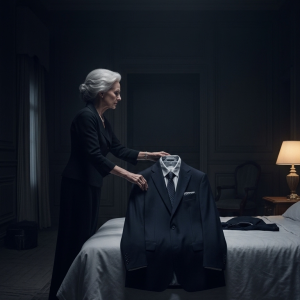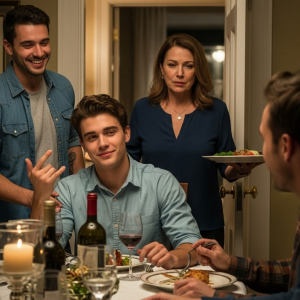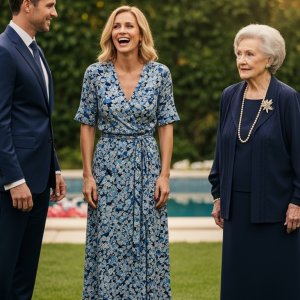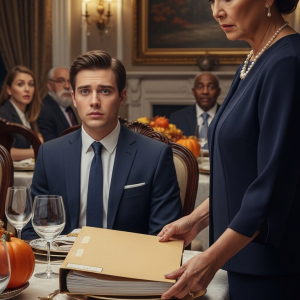The city at 2 a.m. was a lonely place. For Officer Ben Carter, it had become a repository of meaningless tragedies and petty grievances. Ten years on the force had slowly eroded the bright-eyed optimism he’d once had, replacing it with a heavy, bone-deep weariness. The calls all started to blend together: another domestic dispute, another noise complaint, another kid caught spray-painting a wall. He was no longer a guardian of the city; he was its janitor, endlessly cleaning up the same small messes.
He sat in his patrol car, the engine a low hum against the silence, nursing a lukewarm coffee. He’d just finished mediating a fight between two neighbors over a parking spot. The sheer, pointless anger of it all left a bitter taste in his mouth. He idly flipped open his wallet, his thumb tracing the worn, creased edges of a photograph tucked behind his license. It was a picture of a young woman with a kind, tired smile, her hair styled in a way that was decades out of date. His mother.
A flicker of a memory, sharp and unwelcome, pierced through his fatigue. A cramped apartment that always smelled of cough syrup. The sound of a wracking, painful cough from the bedroom. The feeling of utter, paralyzing helplessness. He snapped the wallet shut, pushing the ghost back into the recesses of his mind.
That’s when the radio crackled to life. “Unit 12, we have a 4-8-4 at the 24-hour pharmacy on Elm and Ninth. Shoplifting in progress. Suspect is a juvenile, currently detained by store management.”
Ben sighed, rubbing his tired eyes. A kid stealing candy or a magazine, most likely. He put the car in drive, the weight of the badge on his chest feeling heavier than ever. Just another small mess to clean up in a city full of them.
The pharmacy was an oasis of sterile, fluorescent light in the dark, sleeping street. Inside, Ben found a man in a manager’s vest standing awkwardly near the checkout counter. Before him, looking impossibly small and frail under the harsh lights, was a boy who couldn’t have been more than twelve. The boy’s face was pale, his eyes wide with a terror that went beyond just being caught. In his hand, he clutched a small, crushed box of antibiotics.
The manager, a man named Mr. Davies, looked almost as distressed as the boy. “I’m… I’m really sorry to have called you, Officer,” he stammered, his voice low. “It’s company policy. I have to report it. He… he tried to hide this. It’s expensive.” He seemed reluctant, a man caught between the demands of his job and the dictate of his conscience.
Ben’s initial approach was automatic, the well-worn script of a thousand similar encounters. “Alright, son, let’s see some ID. What’s your name?”
The boy, whose name was Leo, just shook his head, tears streaming down his face. He looked not like a delinquent, but like a cornered animal. Ben’s tired, by-the-book demeanor began to soften. This wasn’t the usual bravado he encountered. This was desperation.
“Okay,” Ben said, his voice gentler than he intended. “Let’s step outside. You and I are going to have a chat in my car, away from the lights.”
In the quiet, dark sanctuary of the patrol car, the story tumbled out of Leo in a torrent of sobs and hitched breaths. His mother was sick. Really sick. She had pneumonia, and her fever had been dangerously high for two days. He had heard her gasping for breath. They had no insurance. The clinic had given her a prescription, but when he saw the price at the pharmacy, his heart had sunk. It might as well have been a million dollars.
“I didn’t know what else to do,” Leo whispered, his small body shaking. “She just keeps coughing. All night. She won’t wake up.”
Coughing. The word was a key, unlocking the door to the room Ben kept locked in his memory. Suddenly, he wasn’t a 35-year-old cop in a patrol car. He was a 14-year-old boy again, standing helplessly in the doorway of his mother’s bedroom, listening to that same wet, ragged sound. He remembered the empty medicine bottle on her nightstand, the frantic, whispered conversations about money, the crushing poverty that had felt like a physical weight, suffocating them long before the illness did.
The past and the present collided with the force of a physical blow. This wasn’t just another call. This wasn’t a petty crime. This was a ghost. A ghost from his own past, offering him a chance to do what he couldn’t do then. This was a chance to rewrite the ending.
Ben’s professionalism dissolved, replaced by a fierce, protective instinct. He looked at the terrified, tear-streaked face of the boy beside him and saw himself. “Stay here, Leo,” he said, his voice thick with an emotion he hadn’t felt in years. “Don’t move. I’ll be right back.”
He strode back into the pharmacy, his steps filled with a purpose that had been absent just minutes before. The manager, Mr. Davies, looked up nervously.
“There’s been a misunderstanding,” Ben said, his voice firm but calm. He pulled out his own wallet, the one with the faded picture of his mother, and placed his credit card on the counter. “I’ll be paying for this.” He pushed the box of antibiotics toward the manager.
But he didn’t stop there. He grabbed a shopping basket. He walked the aisles with a singular focus, filling the basket with items a sick person would need: cartons of chicken soup, bread, orange juice, a thermometer, a box of fever-reducing medicine. He brought the full basket to the counter.
“Ring all of this up, too,” he commanded gently.
Mr. Davies stared, his mouth slightly agape, as he scanned the items. “Officer, you don’t have to…”
“Yes,” Ben interrupted, his gaze unwavering. “I do. There will be no report. There was no crime here. Just a boy trying to save his mom. We’re clear on that?”
The manager, seeing the profound sincerity in the officer’s eyes, simply nodded, a look of deep respect dawning on his face. “Crystal clear, Officer.”
Ben didn’t arrest Leo. He drove him home. The apartment building was in a rundown part of town, the kind of place filled with people the city had forgotten. Inside, the scene was exactly as Leo had described. His mother was asleep on a worn-out sofa in the small living room, her breathing shallow, her face flushed with fever.
Ben didn’t just drop off the medicine and leave. He woke her gently, explained who he was, and made sure she took the first dose of antibiotics with a glass of water. He put the groceries away in their nearly empty kitchen. He was no longer a cop; he was a caretaker, a guardian, a stand-in for the helpless teenager he had once been. He left his personal cell phone number on a piece of paper by the phone. “Call me if she gets any worse,” he told Leo. “Anytime.”
He walked out into the cold night air, the familiar weight of his badge feeling different. It felt lighter. For the first time in a long time, he felt like he had actually helped someone. He thought the story was over, a quiet, private act of closure. He couldn’t have been more wrong.
Mr. Davies couldn’t sleep that night. The image of the tough-looking cop gently buying soup for a sick woman he’d never met was burned into his mind. On a hunch, he went into his office and pulled up the security footage from the evening.
He watched the whole encounter again on the grainy black-and-white monitor. He saw the tired officer’s initial, detached approach. He saw the conversation in the patrol car through the pharmacy window. And he saw the officer’s transformation when he came back inside, his face etched with a profound sense of purpose. He saw an act of pure, unscripted humanity.
His first instinct was to delete the footage, to protect the privacy of the officer and the boy. It was what company policy would demand. But then he thought about the story. A story of a system that had failed a desperate family, and of a man in a uniform who had stepped outside that system to do what was right. This story, he realized, needed to be told.
He didn’t send it to the news. He sent it to one person he thought should see it: the city’s Chief of Police. He attached the video file to an email with a simple subject line: “One of your officers.” The body of the email contained just one sentence: “You should be proud.”
The next morning, Ben Carter was making coffee in his kitchen, the events of the previous night feeling like a strange, emotional dream. He turned on the morning news, and his heart stopped. There, on the screen, was a blurry, black-and-white video taken from a high angle. He saw a uniformed figure—himself—at the counter of the pharmacy, a small, blurred-out boy standing nearby.
The reporter’s voice was filled with a sense of wonder. “…an anonymous tip led us to this incredible story of compassion. An officer, responding to a shoplifting call, discovered the suspect was a young boy trying to get medicine for his desperately ill mother. But what this officer did next is a powerful reminder of the humanity behind the badge…”
His phone began to ring. It was the Chief’s office. He braced himself for a reprimand for breaking protocol. Instead, the Chief’s voice was thick with emotion. “Carter,” he said. “I… I just want to say thank you. You’ve reminded this entire city what it means to protect and serve.”
The story didn’t just become local news; it exploded. In a world saturated with bad news and division, this simple act of kindness was a lightning rod. The blurry video was shared millions of times. The hashtag #OfficerCarter became a national trend. The story wasn’t just about a kind cop; it became a catalyst for a fierce national debate about the astronomical cost of healthcare and the holes in the social safety net that a 12-year-old boy could fall through.
The “destruction” that followed was not of a person, but of a system’s apathy. Pharmaceutical companies and insurance giants were flooded with angry calls, forced to issue statements and review their patient assistance programs under the glare of the national spotlight. The uncaring, profit-driven facade of the healthcare industry was, for a moment, shattered by the story of one boy and one box of antibiotics.
For Leo and his mother, the world transformed overnight. A GoFundMe page, started by the news station, surpassed its goal of $5,000 in less than an hour. By the end of the week, it had topped one hundred thousand dollars, donated by strangers from all over the country who had been moved by their story. Leo’s mother recovered fully. With the donations, she was able to pay off their medical debts, move to a better apartment, and find a stable job with health benefits. She was no longer a statistic; she was a symbol of a community’s capacity for compassion.
For Ben Carter, the cynicism that had plagued him for years was utterly destroyed, replaced by a renewed sense of purpose. He wasn’t reprimanded; he was celebrated as a city hero. He was quickly promoted to lead a new Community Outreach division, a role where his empathy and wisdom could do the most good.
A few months later, the city officially announced the formation of a new non-profit, funded by a partnership between the police department and local businesses. It was called “The Carter Fund,” an emergency resource dedicated to providing immediate financial assistance to families facing a medical crisis.
One evening, Ben, now in a plain suit instead of his old uniform, knocked on the door of a small, cheerful apartment. The door was opened by a healthy, smiling woman. Behind her, a happy, energetic 12-year-old boy beamed.
“Officer Carter!” Leo yelled, running to give him a hug. “Mom made lasagna!”
Ben sat down at their dinner table, a world away from the cold, lonely patrol car where this story had begun. He looked at the healthy mother and the happy son, and the ghost of his own past finally, mercifully, faded away. He hadn’t been able to rewrite his own ending, but he had given a new, hopeful beginning to someone else. And in doing so, a single, tired cop, in a small act of kindness on a cold, dark night, had reminded an entire city how to care again.




